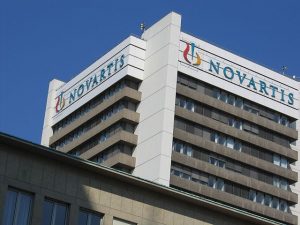
“Industria Novartis” by -Andrew-. Licensed under CC BY 2.0.
On Monday, October 30th, Swiss pharmaceutical company Novartis (NYSE:NVS) announced that it had agreed to acquire French radiopharmaceutical firm Advanced Accelerator Applications (AAA) in a deal which values AAA at $3.9 billion USD. The deal, funded through short- and long-term debt, adds the radioligand therapy (RDL) known as Lutathera to the Novartis pipeline. This drug, approved for use in the European Union and currently undergoing trials for approval by the U.S. Food and Drug Administration (FDA), is used in the treatment of patients suffering from neuroendocrine tumors.
The timing of Novartis’ acquisition of AAA is interesting given the company’s need to strengthen its oncology and cancer treatment pipeline, according to news reports. In 2016, Novartis’ patents covering the blood cancer drug Gleevec expired, leaving the company open to a much greater risk that generic drugmakers could market off-brand Gleevec and eat into the reported $5 billion which Novartis enjoys annually for sales of its branded drug. According to The Wall Street Journal, Lutathera is expected to peak at annual sales of a relatively meager $500 million, but the acquisition does strengthen Novartis’ oncology portfolio.
Informed observers from the intellectual property world will note that the Novartis acquisition is a great sign that strong intellectual property protection is important to large corporations, important enough that these firms are forced to either innovative or acquire innovative products from smaller firms. The loss of patent protection for Gleevec provides Novartis with the impetus from generic competitors to find a new, valuable oncology asset to acquire. If companies don’t pursue an acquisition or research and development of new drugs, it can hurt a firm’s bottom line moving forward, especially in the pharmaceutical world. For instance, rival American drugmaker Pfizer saw its annual revenues drop by nearly $20 billion between 2010 and 2015 after the loss of patent protection for its blockbuster high cholesterol treatment Lipitor.
Lutathera gives Novartis an entry into the radiopharmaceutical sector of the oncology market. Radiopharmaceuticals are medicinal formulations which include radioisotopes used clinically to both diagnose and treat tumors. This September, Lutathera was approved for use in Europe to treat unresectable or metastatic, progressive, well differentiated, somatostatin receptor positive gastroenteropancreatic neuroendocrine tumors (GEP-NETs). In a Phase III clinical trial, Lutathera achieved a 79 percent reduction in risk of disease progression or death compared to a control therapy.

![[IPWatchdog Logo]](https://ipwatchdog.com/wp-content/themes/IPWatchdog%20-%202023/assets/images/temp/logo-small@2x.png)

![[Advertisement]](https://ipwatchdog.com/wp-content/uploads/2024/04/UnitedLex-May-2-2024-sidebar-700x500-1.jpg)
![[Advertisement]](https://ipwatchdog.com/wp-content/uploads/2024/04/Artificial-Intelligence-2024-REPLAY-sidebar-700x500-corrected.jpg)
![[Advertisement]](https://ipwatchdog.com/wp-content/uploads/2024/04/Patent-Litigation-Masters-2024-sidebar-700x500-1.jpg)

![[Advertisement]](https://ipwatchdog.com/wp-content/uploads/2021/12/WEBINAR-336-x-280-px.png)
![[Advertisement]](https://ipwatchdog.com/wp-content/uploads/2021/12/2021-Patent-Practice-on-Demand-recorded-Feb-2021-336-x-280.jpg)
![[Advertisement]](https://ipwatchdog.com/wp-content/uploads/2021/12/Ad-4-The-Invent-Patent-System™.png)






Join the Discussion
No comments yet.